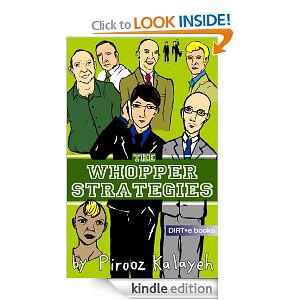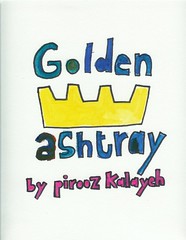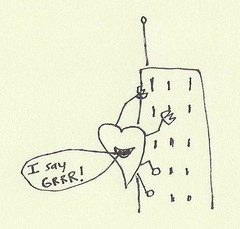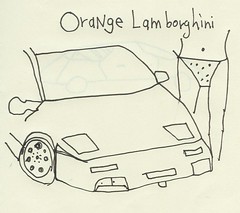 Ofelia Hunt is not inside a box. I can't wind her up. If I were inside a box, I would want Ofelia to put me in a meadow. I would want there to be tigers there. They wouldn't be too close though. They would be close enough for me to get scared, but not far enough away from me to not feel like a tiger. Then I would growl. Maybe, Ofelia would growl with me. We would drink Diet Cokes and talk about how Mars might be close enough for a launch. "I would go with you to Mars," she'd say. Then she would put me back in the box. I don't know what she would do after that. I'm not Ofelia Hunt. I love her stories though. They weld together reality and interior examinations unlike any other writer of her generation. You are at once intrigued, temporarily displaced, and hungry for more. Her most recent publication, My Eventual Bloodless Coup, displays her commitment to what she describes as her "lying" process and the potential for a "hyper-reality" to be traversed by her endless imagination.
Ofelia Hunt is not inside a box. I can't wind her up. If I were inside a box, I would want Ofelia to put me in a meadow. I would want there to be tigers there. They wouldn't be too close though. They would be close enough for me to get scared, but not far enough away from me to not feel like a tiger. Then I would growl. Maybe, Ofelia would growl with me. We would drink Diet Cokes and talk about how Mars might be close enough for a launch. "I would go with you to Mars," she'd say. Then she would put me back in the box. I don't know what she would do after that. I'm not Ofelia Hunt. I love her stories though. They weld together reality and interior examinations unlike any other writer of her generation. You are at once intrigued, temporarily displaced, and hungry for more. Her most recent publication, My Eventual Bloodless Coup, displays her commitment to what she describes as her "lying" process and the potential for a "hyper-reality" to be traversed by her endless imagination. Pirooz Kalayeh: I love how your characters see different possibilities outside of their current reality. What brought this choice about for you?
Ofelia Hunt: This is a difficult question for me to answer. I wrote an answer and then deleted the answer and now I'm writing another answer. I think there are three things, maybe. I, as a person, have often been caught up in idle thoughts and maybe start laughing to myself and then someone comes and wonders why I'm laughing and I can't explain it because it's not interesting to say it in words. I think maybe this happens with a lot of people and I think it is interesting. The second thing is lying. I think lying is very interesting and fun and sort of game-like. I come from a middlingly large family and we lie to each other all the time. The more elaborate the lie the better, and if we can convince someone of its truth... I think I want my characters to also lie in this way, to themselves, to each other, in their imagination so that everything is some level of lie. Maybe, and I'm just thinking this now, this imagination is the preparation for future lying, to the self, to others, etc... I think the third thing is that it's more fun to write, and more interesting to me.
Pirooz Kalayeh: It's interesting that you call your characters' imaginative dialogues lies, because they carry such a truth for me. It's like you said, "[We get] caught up in idle thoughts...[it] happens with a lot of people." Do you believe mapping out interior monologues will make your characters more human and real for your audience? Does it make it more real for you?
Ofelia Hunt: I think it makes it more real for me. I don't know if it's more real for other people. I think there might be a kind of weird reality to it, in that a person can relate, but maybe the writing goes a little too far, interior monologues that go on longer and maybe more detailed than is realistic. I think maybe I would refer to Stephen Dixon here who's often talked about as hyper-real [I may have made that up] and when I read Stephen Dixon, like in End of I or Interstate, I read these massive interior monologues that seem very realistic, very thought-like, and yet I know they go on much longer than I've ever experienced, and what I imagine any other person would experience. Of course, interior monologues in my stories are probably very different from Dixon's novels but I think maybe there is a similar idea - the taking of something realistic and then magnifying it in some way for effect. I find this entertaining, for me anyway. It makes the writing fun. Like, I'll be writing a story and then I start some kind of interior monologue and when I'm done I feel very satisfied and I re-read it and edit and I am happier. This is maybe the most fun part of writing a story for me.
Pirooz Kalayeh: Yes, I hear you. It reminds me of the songwriting process – when I’m working with a group of musicians there is a blissful freedom in letting the elements wander collectively before we assign any set parameters. In some cases, there never needs to be anything agreed upon, because everyone syncs up without a single word spoken. These moments are rare, but they happen quite regularly if the musicians are unattached to the outcome. Of course, writing is more solitary, and in so being, can cause a bit more difficulty when trying to tap into a rhythm. But I have experienced keyed-in improvisations, and have heard of others going through similar movements in their work. Is this what you are experiencing, when you talk about the “satisfaction” of a completed monologue? And, if so, do you ever set any parameters within your process about how you begin or proceed through the interior lies of your characters?
Ofelia Hunt: I think, yes, this could be a similar experience. Writing is a strange act for me. I never have a plan at all. No outline. Not even a general idea of what I want to "happen". So writing is a kind of improvisation. But much of it is sitting and staring at a computer screen, maybe reading a little, and always listening to music. When I'm writing these monologues, and also other parts that come very quickly, it's when I am so focused on the writing, the screen, the words, that nothing can distract me. I can no longer hear the music I'm listening to etc... This is very satisfying and I write large chunks very quickly. In the Bear Parade E-book, most of those stories are around 1000 words and they were all written at once, maybe over an hour or two, and then edited later, so maybe 1000 words is the upper limit of that kind of concentration. So a lot of writing for me is an attempt to get to that level of concentration where writing is very easy and enjoyable. I listen to music. I wake very early in the morning so there are no extraneous sounds, no outside distractions. As far as parameters, I don't set any, at least not consciously. I suppose I try to be consistent, if I've created a character and that character has certain traits, I stick with those, but it is never a conscious thought.
Pirooz Kalayeh: Is the novel you've begun to post on your blog also an attempt to reach this level of concentration?
Ofelia Hunt: I think yes, or, for me, all writing is me trying to get that level of concentration, because that is when I really enjoy writing. It is nice later, too, when you are finished and happy with what you wrote, but to be totally focused on writing is probably the best part for me.
Pirooz Kalayeh: You mentioned Stephen Dixon earlier. Does his writing carry this level of concentration for you? Is this even something you look for when you read other writers?
Ofelia Hunt: I don't know. I don't think that is something I could recognize in someone else’s writing. I think in my reading I'm looking for writing I enjoy or that makes me feel comfortable or excited, with a minimum of distractions.
Pirooz Kalayeh: What would you classify as a distraction?
Ofelia Hunt: There are only a few things. I think when the sentences consistently have too many extra words. Also when the writer tells me something I didn't need to know, too many details - I guess not trusting me to fill in the holes. And probably when I feel like the writer is trying to impress me with vocabulary.
Pirooz Kalayeh: It sounds like for all the lying you claim to do, there is a lot of integrity at stake in the writing you read and create. Is this something you've naturally gravitated towards? Was there a key moment for you where you're tastes suddenly shifted to include the level of concentration you speak of? And, if so, how much of a factor was integrity to how this came about?
Ofelia Hunt: I'm not totally sure I can answer that. I began reading when I was very young, but mostly mysteries and science-fiction novels. In high school I became suddenly fascinated by Kurt Vonnegut and read everything he wrote several times. I still liked the science fiction then. In my early twenties I thought it was important to read classics so I read Tolstoy, Dostoyevsky, Beckett, Chekhov, Faulkner, Hemingway, Kafka, Woolf, Borges, etc. Some of this I liked, some I thought was very boring. I read like 1200 pages of War and Peace and then suddenly realized that I didn't care what happed next and quit. I tried to read anything mentioned in the books I read, so when I read that Vonnegut had read Journey to the End of the Night, I read 'Journey to the End of the Night'. I think after that the books I liked most were books that didn't distract me. If I read Steven King, I feel very distracted by extra words and maybe slick and neat trickery that feels sort of disingenuous. I feel the same with maybe Tom Clancy or Robert Ludlum or something. I find Kerouac's 'On the Road' to be very distracting. I don't know if I can use the word 'integrity' anywhere here. In a way, I guess I think writers should be committed to their writing and make it exactly what they want it to be. I don't think that writing “lies” is necessarily lacking in integrity. I think Catch 22 is a very good book and it is all lies in its way. In Cat's Cradle the narrator says something about everything being a pack of lies near the beginning. I think that lies are interesting and maybe have a story of their own and that I can learn things from the lies people tell, maybe more than the truth that people think they tell. This may be where I become a sophist or a relativist or something because I feel like there is no one truth and that all people create their own truth through some kind of personal perception, frame of reference, context etc.... This is kind of a long answer. My short answer is yes and no. I think I have a hard time with the word 'integrity' because it implies to me a one-truth ideology (I don't know why this is) but maybe 'commitment' is the word I would use.

Ofelia Hunt lives in Portland and Seattle. Poems are available online at Apocryphal Text and Dusie. She is the author of "My Eventual Bloodless Coup," a fiction chapbook at Bear Parade.












2 comments:
No comment on your writing in the grand scheme of American politics and the culture of lying?
I know you don't think about things like that. I just thought it would be fun to hear your answer. You write very good answers. And non-answers. If someone interviewed me, I would want to write good non-answers and answers.
You should answer/non-answer my question. I would like that very much.
i started reading by reading a lot of kurt vonnegut in high school also
lying is good
Post a Comment